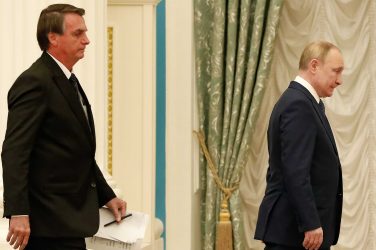 Speaking at a press conference in Brazilian capital Brasília the Iranian ambassador to Brazil, Mohsen Shaterzadeh, praised the Brazilian government support for the decision by the president of Iran, Mahmoud Ahmadinejad, to enrich uranium to 20% beginning today.
Speaking at a press conference in Brazilian capital Brasília the Iranian ambassador to Brazil, Mohsen Shaterzadeh, praised the Brazilian government support for the decision by the president of Iran, Mahmoud Ahmadinejad, to enrich uranium to 20% beginning today.
Shaterzadeh declared that the Iranian nuclear program is similar to the Brazilian nuclear program, although there are suspicions in the international community that Iran is secretly working to enrich uranium in order to make bombs for military purposes.
The ambassador rebuffed that criticism saying: “Countries like Brazil and Iran do not want to use nuclear energy to produce weapons. Nuclear energy in Iran, as in Brazil, is for medical and agricultural objectives. There is a right for nations to use this technology for the well-being of their population.”
He added that Iran trusts Brazil, “We believe that Brazilian authorities are aware of the situation and position of Iran. Brazil is not a nation that wants to colonize other nations, unlike many other countries that have reacted negatively [to the Iranian decision to enrich its uranium to 20%].”
The ambassador went on to say that countries led by the United States, such as England, Germany and France, the ones that suspect Iran [wants to produce nuclear weapons] should set an example and change their position.
“Those who come out so strongly against nuclear weapons should [practice what they preach]: first destroy their own weapons before telling others to do so.”
The Iranian project of uranium enrichment to 20% is part of plan to buy the product from other countries and does not infringe on international norms, declared the ambassador.
“Iran will show that the Western countries are lying, they are not sincere. Therefore, even as Iran begins to produce its own uranium at 20%, it is willing to buy and will not disobey any international norm in doing so. What we are doing is in full compliance with the International Atomic Energy Agency (IAEA),” concluded Shaterzadeh.
IAEA Inspection
A day after announcing it will enrich uranium to 20%, Iran says it is open to inspection by the International Atomic Energy Agency (IAEA), according to the official (state-run) news agency, Irna.
And the Iranian representative at the IAEA, Ali Asghar Soltaniyeh, says that he has presented a detailed report on what Iran is doing so foreign specialists know what is happening. Soltaniyeh goes on to say that Iran wants the material [uranium] for “humanitarian questions,” as it will be used in the treatment of the sick and ill.
And that, “Iran has given the industrialized nations an opportunity.” At the same time, the president of Iran, Mahmoud Ahmadinejad, continues to claim in public that the enemies of Iran are opposed to the nuclear and technological progress of his country.
Meanwhile, at the United Nations Security Council, Brazil (now a temporary member for a two-year period) has joined China (a permanent, veto-wielding member) in calling for more talks with Iran regarding the nuclear question.
The United States, France, England, Russia and Germany are for more, harsher sanctions following the latest news from Tehran. At the moment, France presides over the Security Council and has expressed strong opposition to the Iranian nuclear program.
As a matter of fact, France has joined the United States in leading a movement by the international community to pressure Iran into backing off its plans to enrich uranium to 20% as part of its nuclear program. France and the US have made it clear that if Ahmadinejad insists on the 20% plan they will impose more sanctions on Iran.
One of the things they can do is halt exports to Iran of gasoline. Although Iran is one of the world’s largest exporters of petroleum, what they export is crude oil; they do not refine it. So they have to import gasoline.
The ministers of Defense of both France and the United States have recently made similar statements to the effect that, although the dialogue has to continue, the goal is that Iran should not be allowed to produce nuclear weapons. Herve Morin, the French minister of Defense, says that there is no doubt that Iranian nuclear ambitions are in the military area.
The UN Security Council has already imposed three rounds of sanctions on Iran.
At the moment, Iran is enriching uranium at 3.5%, but needs to reach 20% to make the fuel viable for running a nuclear reactor that produces isotopes for medical purposes. An atomic bomb uses uranium enriched to 90%.




